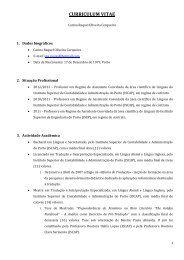para uma leitura não-biográfica da obra de mário de sá-carneiro
para uma leitura não-biográfica da obra de mário de sá-carneiro
para uma leitura não-biográfica da obra de mário de sá-carneiro
You also want an ePaper? Increase the reach of your titles
YUMPU automatically turns print PDFs into web optimized ePapers that Google loves.
175 polissema 7 2007<br />
serving, openly or shadowy, the immutable i<strong>de</strong>ological positions and policy of an<br />
inflexible totalitarianism. And yet not all Soviet literature is socialist realist. Not even<br />
non-dissi<strong>de</strong>nt literature is socialist realist and it is worth to be read and analysed.<br />
Palavras-chave: O futurismo russo, literatura soviética, Vladimir Mayakovsky – poeta,<br />
dramaturgo, agitador político.<br />
*<br />
Introdução<br />
Se, como diz Jean Baudrillard, “globalization is the globalization of technologies,<br />
the market, tourism, information. Universality is the universality of values, h<strong>uma</strong>n rights,<br />
freedoms, culture, <strong>de</strong>mocracy” (1998: 11), então, <strong>de</strong> forma a evitar “the paroxysm”, isto<br />
é, “the penultime moment […], the moment just before the end, just before there’s<br />
nothing more to be said” (Ibid: Intr.), talvez seja necess ário aproveitar a oportuni<strong>da</strong><strong>de</strong><br />
única <strong>de</strong> fazer reemergir, dos fragmentos do espelho partido do universal, to<strong>da</strong>s as<br />
singulari<strong>da</strong><strong>de</strong>s.<br />
É tempo <strong>de</strong> a Que<strong>da</strong> do Muro <strong>de</strong> Berlim se tornar símbolo do triunfo do<br />
pensamento universal sobre a “pensée unique” (Ibid.: 12) e que se volte a <strong>da</strong>r forma à<br />
ilusão, ao sonho, no sentido positivo do termo, n<strong>uma</strong>, porventura, <strong>de</strong>rra<strong>de</strong>ira tentativa <strong>de</strong><br />
fazer ressurgir os valores culturais e estéticos, <strong>de</strong> tornar o Outro, o diferente, <strong>de</strong> novo<br />
visível a nossos olhos, já que fun<strong>da</strong>mental <strong>para</strong> a <strong>de</strong>finição <strong>da</strong> nossa própria i<strong>de</strong>nti<strong>da</strong><strong>de</strong>.<br />
É, conforme afirma Boaventura <strong>de</strong> Sousa Santos, “<strong>da</strong> consciência <strong>da</strong> incompletu<strong>de</strong><br />
cultural” que “nasce o impulso individual ou colectivo <strong>para</strong> o diálogo intercultural”<br />
(2006: 425) que permite “<strong>não</strong> reduzir a reali<strong>da</strong><strong>de</strong> apenas ao que existe” (Ibid.: 435).<br />
Em termos <strong>de</strong> análise literária, este processo passaria, creio, por conhecer o que se<br />
produziu, e produz actualmente, <strong>para</strong> lá do muro imaginário que teima em subsistir nas<br />
nossas mentes, e que nos permitiria, finalmente, <strong>de</strong>sfrutar <strong>da</strong> <strong>leitura</strong> <strong>de</strong> <strong>obra</strong>s <strong>de</strong> autores<br />
como S. Essénine, A. Biéli, M. Tzvietaieva, A. Tolstoi, A. Achmatova, A. Block, I.



